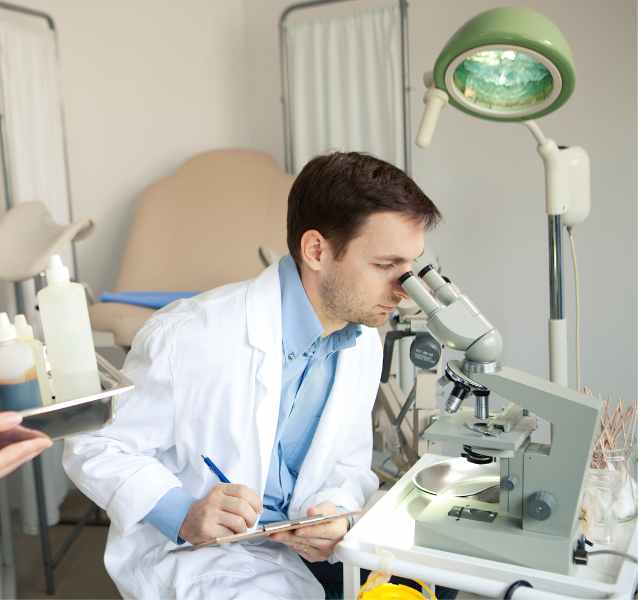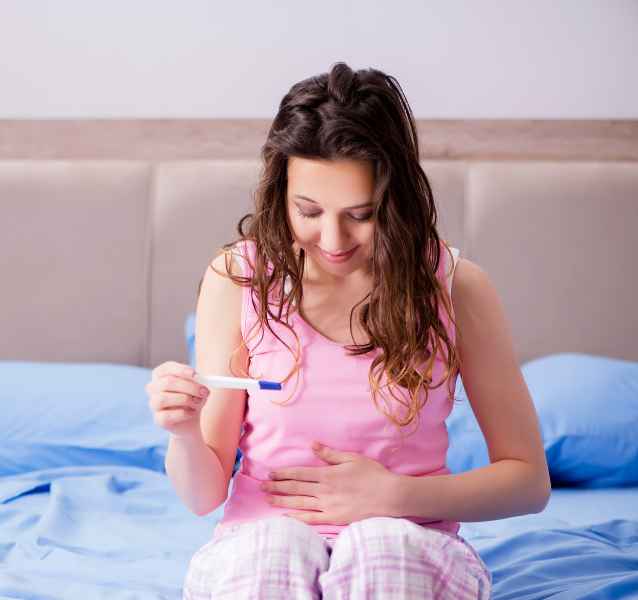A fertility evaluation includes exams and tests to try to find the reason why you and your partner have not gotten pregnant. It is the first step of the infertility management to find out the cause of infertility. So, both female & male partner are tested for infertility. After taking detailed history of the couple, we advise them following infertility assessment tests.
Experts recommend a fertility evaluation if you have not gotten pregnant after 1 year of having regular sexual intercourse without using birth control. If you are older than 35, an evaluation is recommended after 6 months of trying. If you are older than 40, talk with your obstetrician–gynecologist (ob-gyn) now about an evaluation.
Blood Tests: Ovarian Reserve Test – AMH levels, FSH-LH-Prolactin Levels, Estradiol test, Thyroid Profile, STD profile (depends upon history), Diabetes profile.
Other Tests: Basal Body Temperature Charting, Post Coital test to understand cervical mucus, Transvaginal (pelvic) Ultrasound Exam to know any structural abnormalities, fibroids etc., Hysterosalpingogram to check for blockages in the fallopian tubes and defects in the uterus, Hysteroscopy.
Medical history and physical evaluation is done before conducting tests. First and foremost is semen analysis, to find the quality & quantity of sperms, Scrotal Ultrasound, Post-ejaculation Urinalysis, STD analysis, Genetic Tests to find chromosomal abnormalities, Specialized Sperm Function Tests to check how well the sperm behave after ejaculation.
Tubal Patency is evaluated to detect anatomical deformity or obstruction in the fallopian tubes. Basic Evaluation: Hysterosalpingography (HSG)-Radiological imaging study. Advanced Evaluation: Laparohysteroscopy to evaluate uterus fallopian tubes ovaries and internal pelvic area with the use of laparoscope.
After complete fertility evaluation, infertility treatment plan is decided. Our aim is to achieve natural conception or assisted conception with advanced treatment options with less complications.
Dr. Hrishikesh Pandit is the pioneer pf 3D laparoscopy technique in Ahmednagar. His experience and skill makes him one of the best laparoscopic surgeon in India.
At Pandit Hospital, you are in safe hands!
To consult Dr. Hrishikesh Pandit, Click Below,
Dr. Hrishikesh Pandit : Best Infertility Treatment in Ahmednagar
About author:
Dr. Hrishikesh Pandit:
Dr. Hrishikesh Pandit is one of the best obstetrician and gynecologist in India. He is also a well-renowned Laparoscopic surgeon. He obtained his MS (Ob Gyn) degree from the prestigious Pravara Institute of Medical Sciences. He has also done fellowship and diploma courses in laparoscopic surgeries and cancer treatment from Tata Hospital and Keil University, Germany. His surgical cases, papers and videos has been chosen in many international forums of gynecology.
Why Pandit Hospital?
At Pandit Hospital, we are always working hard to provide its patients with the highest level of medical innovation and patient care. With the aim of delivering complete maternity & gynecological care under one roof with the help of all contemporary amenities and cutting-edge medical equipment. Dr. Hrishikesh Pandit has a vision to bring the best of facilities regarding laparoscopy surgeries in the city of Ahmednagar. He is the pioneer of 3D Laparoscopy technology is Ahmednagar.
FAQ
You should consult a doctor during the first 6 to 8 weeks of your pregnancy, or when your period is 2 to 4 weeks late.
If your contractions are 5 minutes apart, lasting for 1 minute, for 1 hour or longer, it’s time to head to the hospital.
Doctors recommend an infertility evaluation if you have not gotten pregnant after 1 year of having regular sexual intercourse without using birth control. If you are older than 35, an evaluation is recommended after 6 months of trying.
Yes, You can. But most babies need 39 weeks to develop fully. Induced or planned delivery before that time—without a valid medical reason—is not in the best interest of the baby or the mother. After 39 weeks you can plan delivery.
Women who are 21 to 29 should have a Pap test alone every 3 years. HPV testing alone can be considered for women who are 25 to 29, but Pap tests are preferred. Women who are 30 to 65 have three options for testing. They can have a Pap test and an HPV test (co-testing) every 5 years. They can have a Pap test alone every 3 years. Or they can have HPV testing alone every 5 years.
Laparoscopic hysterectomy is a safe and suitable procedure for chosen patients. It affords patients advantages like less peri-operative morbidity, better life quality, shorter hospitalization time, and faster return to activity.
Schedule a doctor’s visit if you have: Greenish, yellowish, thick or cheesy vaginal discharge; Strong vaginal odor; Redness, itching, burning or irritation of your vagina or the area of skin that surrounds the vagina and urethra (vulva); Bleeding or spotting unrelated to your period.
Painless delivery can be achieved using a form of regional anesthesia that provides pain relief during natural labor. Epidural anesthesia is administered through an injection on the lower back of the mother. The drug takes about 10-15 minutes to take effect.
Even in severe cases of endometriosis, most can be treated with laparoscopic surgery. In laparoscopic surgery, your surgeon inserts a slender viewing instrument (laparoscope) through a small incision near your navel and inserts instruments to remove endometrial tissue through another small incision.
The HPV vaccine is recommended for routine vaccination at the age of 11 or 12 years. (Vaccination can be started at age 9.) It is also recommended that vaccination for everyone through age 26 years if not adequately vaccinated when younger. HPV vaccination is given as a series of either two or three doses, depending on age at initial vaccination.





